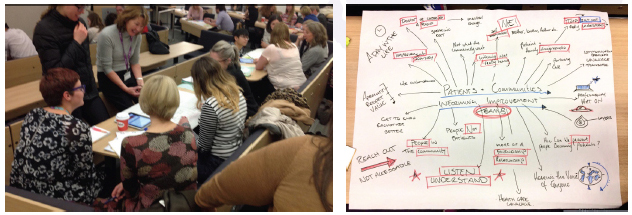Realising Realistic Medicine: Chief Medical Officer for Scotland annual report 2015-2016 appendix
Case studies of applying the personalised, patient-centred Realistic Medicine approach across Scotland.
University of Dundee
Initial thoughts
Realistic Medicine links closely with changes to the curriculum that have been developed in recent years. A wide variety of University initiatives link closely with Realistic Medicine, however it is essential to recognise the link between the Universities and local NHS services in providing a Realistic approach to care.
What have we done so far?
A wide variety of initiatives are underway. Habits of Improvers is already embedded in teaching and most recently a session was held connecting staff and students from the NHS, University and third sector. Students were from the medical and art schools. They worked together to focus on example themes with most choosing 'Patients and the community'. The King's Fund has been used to inspire work around shadowing patient journeys and collecting patient stories while recording 'touchpoints' where patients connect with the service. This has been tested in a summer scholarship and spread to one tutor group, who reflected positively.
Patient experience interviews have been started - with two students interviewing patients two weeks after discharge, focusing in the holistic experience of care.
The lecture theatre at the Medical School has been redesigned to support team-based learning and move away from solely didactic teaching.
Interprofessional teaching has also been recognised as being key to providing patient-centred care in the future. Students now undertake interprofessional education alongside dentistry, nursing, social work and Allied Health Professions students - linking with the universities of Abertay and St Andrews. Early in the course students are linked and must undertake 'team tasks' which do not presume a specific professional role - for instance using team skills to triage simulated patients in an earthquake scenario.
What next?
The summer scholarship received good feedback and investigation on how to make this a core part of the curriculum is underway.
This year students in second year will start attending the pre-assessment clinic and interview patients after the appointment, focusing on their experience.
The aim is to make patient interviewing and shadowing in this context core within the next three years. Over five years all MBChB students will be required to be involved in improvement work using a variety of methodologies.
Team tasks will be built upon as part of the 'doctors as professionals' theme. The link with Abertay University is new and in March 2017 work will start on a module around communicating with people with disabilities, involving real carers and people using services. This will be a move away from classroom-based learning into the community.
Final thoughts
Interprofessional education allows students to better understand their colleagues' roles at an early stage and prepares them for working at teams where the patient is at the heart and where all team members should share in decisions. This prepares them for practicing in a Realistic Medicine world where patient-centred care will come naturally to them.
Storyboard and Photographs from Interprofessional Learning event in Gannochy Trust Lecture Theatre, Ninewells Hospital.

Contact
Email: Catherine Calderwood
There is a problem
Thanks for your feedback